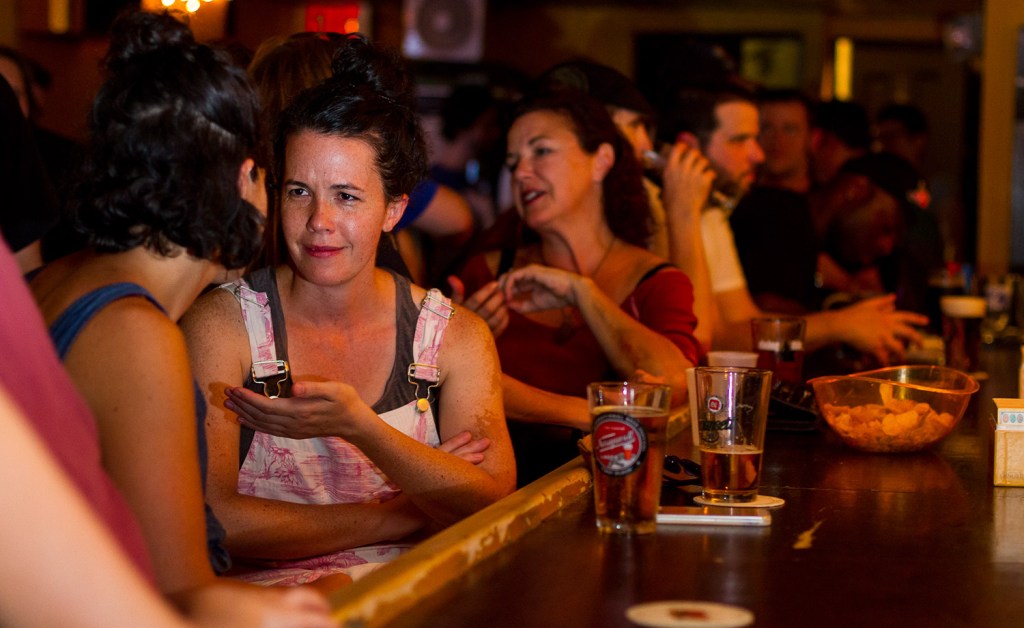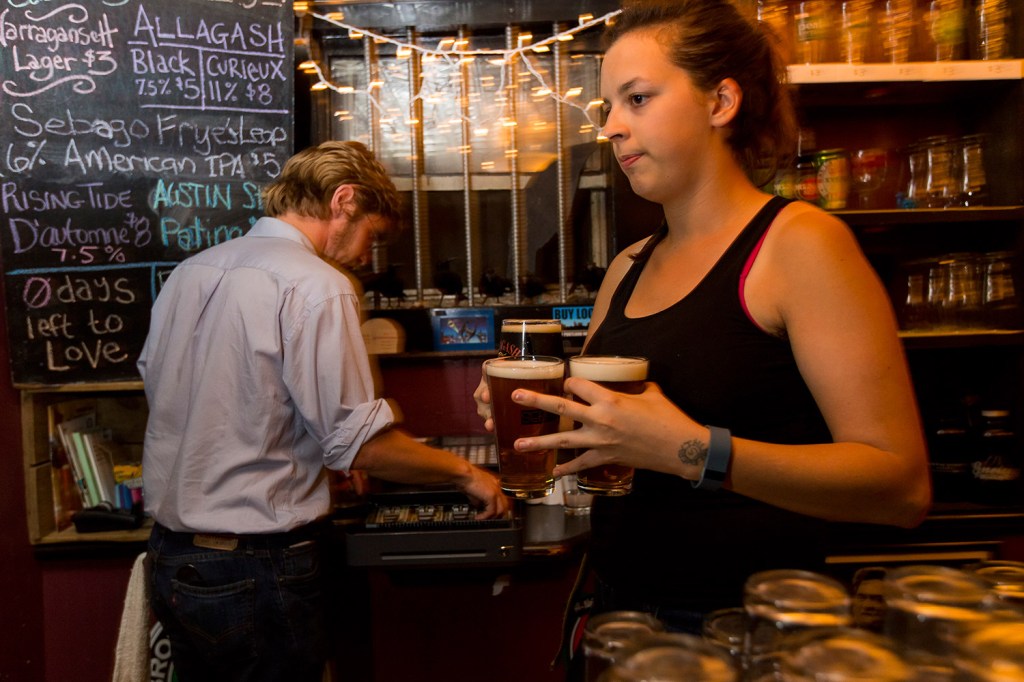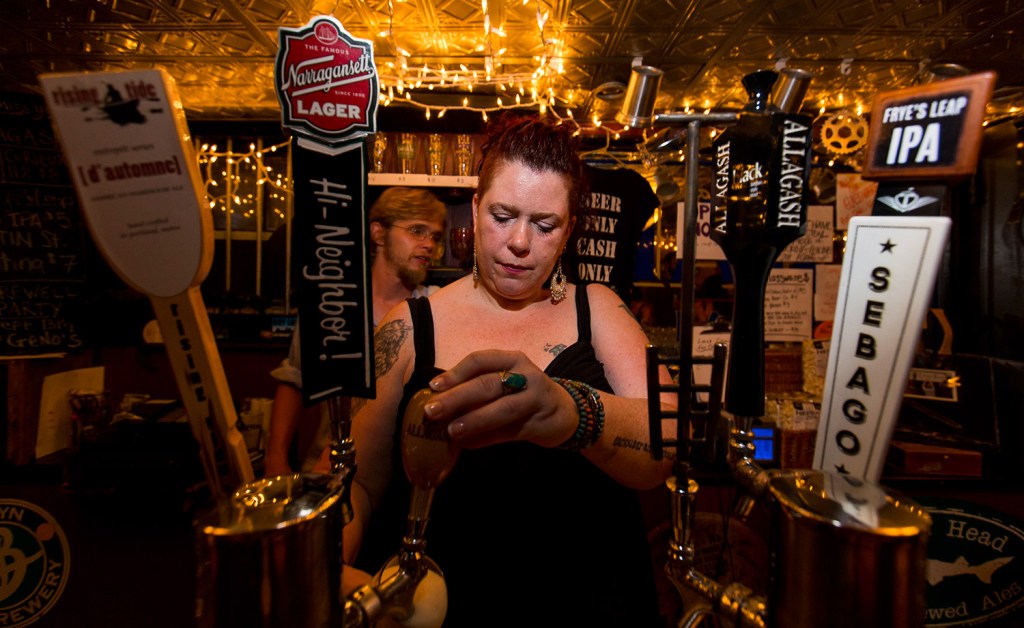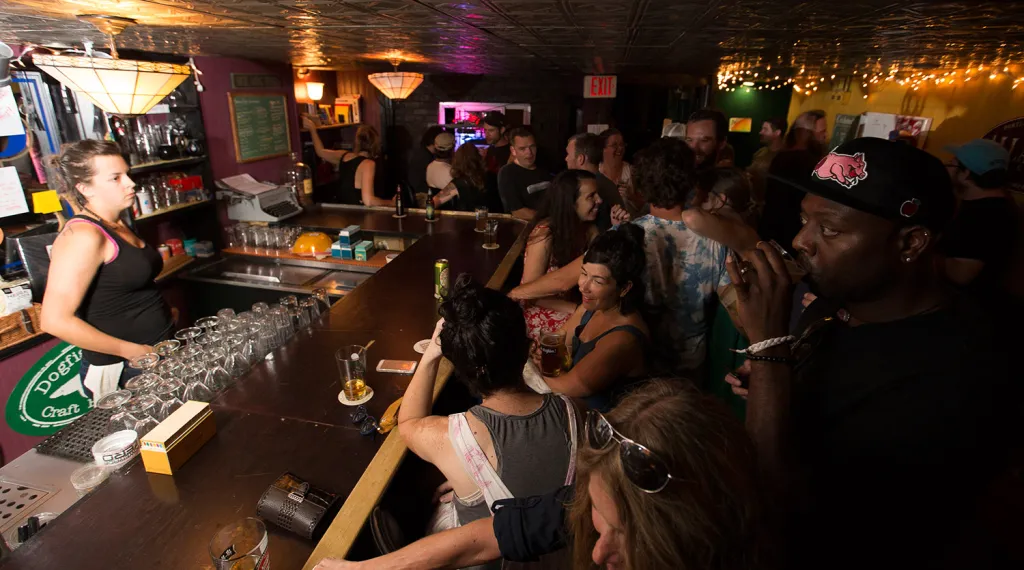It was last call Monday night at Mama’s CrowBar, and the regulars were already reminiscing about the death of a neighborhood pub that felt more like their living room.
Customers crammed into the small, narrow space on Munjoy Hill, hugging their hellos and telling stories over a favorite beer. A chalkboard with the microbrew specials read “0 days left to love” and “We’ll miss you.” Nearby, a handwritten sign offered CrowBar glassware for sale, while another admonished the patrons that “No, you may not have, purchase or steal a piece of the (expletive) ceiling. Stop asking.”
Just like Mama would put it.
Here, Mama is Tricia Pryce Henley, who operates the bar and created this neighborhood gathering spot in 2009, after bartending at the same spot when it was Awful Annie’s. With her son and daughter behind the bar, and her neighbors and friends on the other side, it’s been a family affair from the beginning. That makes shutting down all the more bitter.
“Honestly? I thought I was building a legacy for my children,” said Henley, smoking a cigarette on the back patio of the bar.
Henley didn’t want to close the bar. The building sold in 2013, and just before it did, the previous owner tried to evict her, saying she did not have a written lease. Henley went to court and won, but her lease runs out Oct. 1 and the owners made it clear she couldn’t stay.
For regular Jason Cornell, the death of the CrowBar is another sign of the gentrification that chips away at what makes Munjoy Hill unique and quirky.
“I was bummed when Sangillo’s closed. Now this. It’s changing. They’re the canaries in our economic coal mine,” said Cornell, a singer whose stage name is “Brzowski.”
Sangillo’s Tavern on Hampshire Street closed in February. “We need those true, local institutions,” Cornell said.
Customer Taryn Kelley agreed. She and her friends, all regulars, swapped stories about the bar – meeting up there on snowy parking ban nights, spending holidays there, recalling the night Mumford & Sons came in for a few beers after their show on the Eastern Prom.
The CrowBar has the classic tin ceiling and a tile floor, with eclectic furnishings such as a fridge door bolted to the wall and magnetic words for customers to rearrange. A “karmic beer” board lists customer names, for when friends buy a drink for someone who’s not there but may be in later, when they can collect.
“It’s not just a bar. It’s a community. I have a second family here,” said Kelley, who moved to Portland four years ago.
“This is what made this our neighborhood,” chimed in Brian McLeod, another regular.
The bar at 189 Congress St. sits on the first floor of a narrow, three-story building. Behind the nondescript entrance is a narrow space with stools lining a bar, a jukebox, and until last week, a 1932 Wurlitzer piano that doubled as a table for four. When Henley installed a new cooler a year ago, she had to remove the bar to get it in.
Henley carved out the CrowBar’s reputation as a unique bar, with her strong personality and politics informing everything from her ban on bottled water to urging street performers to come perform at the bar. Friends were urged to hang up their art, tell their jokes on comedy night, or play their music on open mic nights.
A shelf of books actually got used by some solitary drinkers, and trivial pursuit cards encouraged impromptu trivia contests. She also wouldn’t tolerate any -isms – sexism, racism, homophobic comments would get you bounced from the bar. Henley said she researched beer companies before serving their beer to make sure their politics lined up with her own.
“Tricia is definitely the mama,” said Pamela Olove, smiling. “She sets the tone.”
Henley held weekly poetry nights, piano nights and other themed events, from bluegrass night to “conspiracy night,” an open mic forum for people to share conspiracy theories. Henley, a poet who has competed nationally, will have a poetry reading Sept. 15 at Bull Feeney’s.
Jimmy Dority, who played piano at the bar, said Henley pushed him to perform even when he didn’t think he could do it.
“This is not only my gig, it’s my home in a lot of ways,” said Dority, who had a $1-a-song rule, except for requiring $50 if you wanted him to play “Piano Man.” (It got played only once – at the last piano night last week – and the collection taken up by customers netted far more than the $50, Dority said.)
“Tricia saw a talent and a light in me as a musical artist and she was tired of me keeping it hidden,” he said. Next spring, he’ll graduate from the University of Southern Maine with a bachelor’s degree in composing. “It would not have happened if not for the CrowBar,” he said.
The idea that it’s over, Dority said, is “surreal.”
“I’m thinking of it as an Irish wake,” he said, as a friend tapped him on the shoulder and gave him a hug on the way to the bar. “I don’t feel sad. I feel really happy and really lucky. I can’t explain how lucky I feel to have been a part of it.”
As for Henley, she’s planning to hit the road soon in an old RV she just bought. The first stop is Texas, to see friends. What she doesn’t want to do is sit in Portland and see what’s coming next for the CrowBar space.
“I’m going to run away for a little while,” she said. “I can see this bar from my apartment. I know I would sit on my deck and watch them tear apart my dream.”
For now, she wants to pour her customers’ beer for one more night.
“Let’s celebrate what we’ve done. People came here and they made friends. They met their neighbors. The neighborhood did this,” said Henley, who has a large crow tattooed on her left arm.
She also sent out a farewell to customers on the bar’s Facebook page.
“I have a million things that I want to say to you Portland (the whiskey might have some thoughts too,)” Henley wrote.
“I want to attach a name and story to every heartbeat I felt against mine in these past seven years and these long, last days. I want to write love letters to ‘regulars’ and poems to strangers. I want to pack it all into a cigar box, bury it in a hope chest and open it in another time to prove that respect, community and art can thrive in a tide of money, greed and contrived nostalgia,” she wrote.
“I want to snapshot all of this for a Portland postcard, for a misfit’s family album.”
Send questions/comments to the editors.








Success. Please wait for the page to reload. If the page does not reload within 5 seconds, please refresh the page.
Enter your email and password to access comments.
Hi, to comment on stories you must . This profile is in addition to your subscription and website login.
Already have a commenting profile? .
Invalid username/password.
Please check your email to confirm and complete your registration.
Only subscribers are eligible to post comments. Please subscribe or login first for digital access. Here’s why.
Use the form below to reset your password. When you've submitted your account email, we will send an email with a reset code.